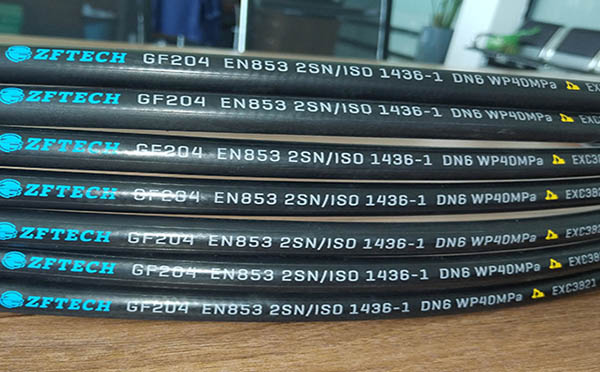Causes of hydraulic hose failure

There are many reasons for hydraulic hose failure, but with proper precautions, the most common failures can be avoided.
Here are some of the most common reasons for hose failure.
1. Corrosion of inner rubber layer
Corrosion of hydraulic hoses often leads to external leakage. Corrosion of the inner layer is usually caused by the concentration of high velocity fluid, or by fine particles in the fluid.
In order to avoid corrosion of the inner rubber layer, the appropriate hose size is determined according to the recommended maximum flow rate. In addition, it should be ensured that the hose assembly does not produce too tight bending, and that the fluid medium does not produce excessive wear on the inner rubber layer of the hose. During hose assembly, it is important to comply with the maximum bending radius and diameter requirements specified in each hose engineering specification.
2. Fluid compatibility
Incompatible fluids will result in deterioration, expansion and delamination of the rubber layer in the hose assembly. In some cases, the inner layer may also be partially destroyed.
The hose must be compatible with the fluid being transferred. Ensure that the fluid is compatible not only with the inner rubber layer, but also with the outer rubber layer, joints, and even O-rings.
3. Dry air/stale air
The inner rubber layer of the hose may develop many tiny cracks due to old or dry air. Sometimes, this type of failure is difficult to detect because the hose can still remain flexible, but there are signs of external leakage.
To avoid dry or stale air problems, make sure your hose is rated for extremely dry air. For these applications, it is best to choose a hose with PKR or EPDM inner rubber material. If possible, the dew point of the air should be raised (for air containing a certain amount of water vapor, the temperature is lowered without changing the air pressure, so that the saturated water vapor pressure is reduced to the temperature equal to the actual water vapor pressure at the time, called the dew point).
4. Minimum bending radius
If the minimum bending radius is not met, the hose assembly may fail relatively quickly.
In vacuum or suction applications, if the bending radius is exceeded, the hose may become flat in the bending area. This will impede or limit the flow of the medium. If the bend is too severe, the hose may become kinked. To prevent minimum bend radius hose failure, the recommended bend radius should be carefully checked.
5. Insert depth
When the hose assembly is not properly crimped, it can cause a very dangerous situation. The joint must be pushed fully onto the hose to meet the recommended insertion depth requirements. The last loop of grip on the joint housing is important for the hose to maintain strength.
6. Incorrect assembly
For hydraulic hose assemblies, contamination can cause a variety of problems. Metal particles and debris may be deposited in the hose when it is cut without proper flushing. These abrasive materials left in the hose will contaminate the hydraulic system. In addition, it may cause a small crack in the inner tube of the hose assembly, resulting in leakage.
In order to prevent hose failure due to contamination, the hose must be properly cleaned before being inserted into the joint. The inner tube should be very clean before inserting the joint. After assembly clamping is complete, ensure that the end is installed in order to keep the hose clean and avoid secondary contamination during transportation.
7. Heat aging
Overheating of the hose assembly can also cause hose failure. Overheating will cause the hose to become very stiff. The internal hose will harden and begin to crack because the plasticizer in the elastomer will begin to break down or harden at high temperatures. In some cases, the mulch may show signs of excessive drying. The hose assembly may retain the shape it was installed in after removal, and a cracking sound will be heard if it is bent.
In order to prevent the hydraulic hose assembly from overheating, it should be confirmed that the rated temperature of the hose meets the temperature requirements of the application. In addition, lowering the ambient temperature or using shields and shields will protect the hose from nearby hot areas.
8. Wear and tear
Hydraulic hoses are subjected to harsh environments every day, and the effects will eventually show up on the hose. If not checked regularly, wear and tear may cause the hose assembly to crack and leak. Excessive friction between the hose and external objects or even another hose will wear off the coating on the hose and eventually wear off the reinforced layer.
Properly assembled and installed hoses will have a longer life, reducing downtime and maintenance costs.
Categories
News
Contact Us
Contact: China Zhuofan Hydraulic Co., Ltd
Phone: +8613184968882
Tel: +8613184968882
E-mail: zfhydraulic@163.com
Add: Jing County, Hengshui City, Hebei Province, China